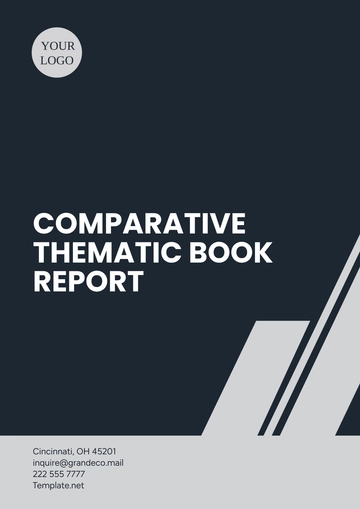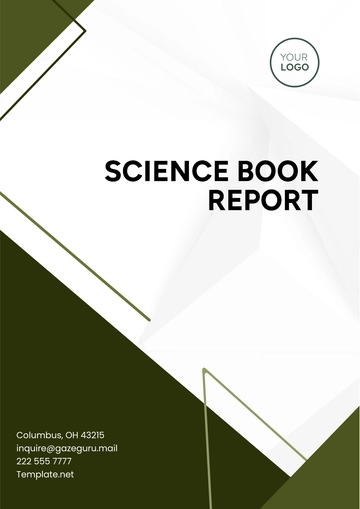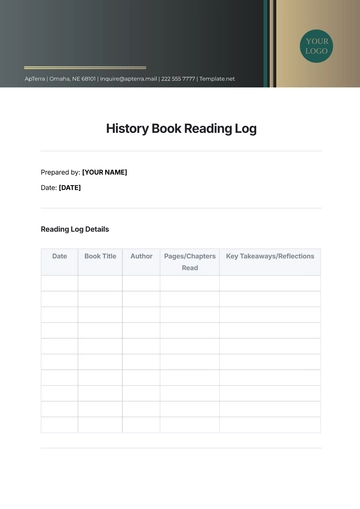Free Bible Book Report

Prepared by:
[YOUR NAME]
[YOUR COMPANY NAME]
Overview
The Book of Genesis, the first book of the Bible, serves as the foundation of both the Jewish and Christian faiths. It covers the creation of the world, the early history of humanity, the origins of the Jewish people, and God's covenant with humanity. It introduces major biblical themes such as creation, sin, judgment, and redemption. Genesis is divided into two main sections: the primeval history (chapters 1-11), which details the creation of the world, the fall of man, the flood, and the scattering of nations; and the patriarchal history (chapters 12-50), which focuses on the lives of the patriarchs—Abraham, Isaac, Jacob, and Joseph.
Key Themes
Creation: Genesis opens with the creation narrative, where God creates the heavens, the earth, and all living beings over six days. This theme emphasizes God's sovereignty and the goodness of creation.
The Fall of Man: In the story of Adam and Eve, Genesis reveals the entrance of sin into the world through disobedience to God's command. This event marks the beginning of humanity's estrangement from God.
The Flood and God's Judgment: In Genesis 6-9, the flood serves as both judgment for humanity's wickedness and a form of divine cleansing. Noah and his family are saved, highlighting themes of grace and redemption.
Covenant: A key theme of Genesis is God's covenant with individuals, especially with Noah and Abraham. God's promises to Abraham—blessing, land, and descendants—are foundational to the rest of the Bible and shape the narrative of the people of Israel.
Faith and Obedience: The lives of the patriarchs illustrate the importance of faith and obedience to God, as seen in Abraham's trust in God's promises and Isaac and Jacob's relationships with God.
Structure and Literary Style
Genesis is structured in a narrative form, presenting historical events with theological significance. It uses a blend of direct storytelling and genealogical records, creating a framework that links generations. The book is rich in symbolism, particularly in the stories of creation, the fall, and the covenant, which have been interpreted in various theological ways throughout history.
Significant Characters
God: In Genesis, God is the Creator, sustainer, and covenant-maker. His character is revealed through His actions—creating the world, providing for humanity, and establishing covenants.
Adam and Eve: The first humans, whose disobedience introduces sin into the world. Their story sets the stage for the need for redemption.
Noah: A righteous man chosen by God to survive the flood and preserve life on Earth. Noah is seen as a model of faithfulness.
Abraham: Known as the father of faith, Abraham’s journey of trust in God and his obedience to divine commands are central to Genesis. God promises him descendants as numerous as the stars.
Joseph: The son of Jacob, whose story of betrayal by his brothers, rise to power in Egypt, and eventual reconciliation with his family exemplifies forgiveness and God’s sovereignty.
Theological Insights
Genesis sets the stage for understanding God's character, human nature, and the world. The idea of a covenant with humanity introduced in Genesis forms the theological basis for the relationship between God and Israel throughout the Bible. God's judgment and mercy are key elements of Genesis, as seen in the flood narrative and the preservation of Noah’s family. The theme of human failure due to sin is balanced by the ongoing faithfulness of God, who works through individuals like Abraham and Joseph to accomplish His purposes.
Personal Reflection
The Book of Genesis is not just a collection of ancient stories but a powerful narrative that continues to shape faith and understanding today. Personally, the themes of covenant and faith resonate deeply, especially in the context of trusting God even when His promises seem delayed or unclear. Abraham’s faith and obedience serve as a reminder of the importance of following God’s guidance in my own life, even when the path is uncertain.
Genesis also highlights the importance of God's grace. Despite human failures, God’s love and commitment to His people are constant. This gives hope that no matter the mistakes made, there is always an opportunity for redemption and reconciliation through God’s faithfulness.
Conclusion
The Book of Genesis is foundational to understanding the Bible. Its stories of creation, the fall, the flood, and the patriarchs not only narrate the beginnings of the world and humanity but also introduce key themes of faith, covenant, and God's enduring commitment to His people. Genesis establishes the framework for the entire biblical narrative and continues to offer timeless lessons about human nature, God’s sovereignty, and the path to redemption.
- 100% Customizable, free editor
- Access 1 Million+ Templates, photo’s & graphics
- Download or share as a template
- Click and replace photos, graphics, text, backgrounds
- Resize, crop, AI write & more
- Access advanced editor
The Bible Book Report Template from Template.net offers an editable and customizable solution for crafting insightful reports on biblical texts. Easily adjust sections, text, and format to suit your needs. Editable in our AI Editor Tool, it allows for seamless personalization, ensuring a professional, tailored report that captures your unique analysis every time.





























